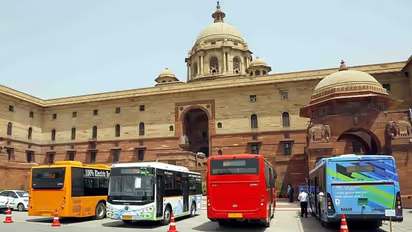Explained: Why Indian Army wants to buy 'green' vehicles

Synopsis
The Indian Army is looking to reduce its carbon footprint and maintenance costs
Aiming to reduce carbon footprint and maintenance costs, the Indian Army is considering procuring electric vehicles in peace stations across the country.
On April 22, Defence Minister Rajnath Singh, Indian Army chief Gen MM Naravane and other senior officers inspected the e-vehicles manufactured by Tata Motors, Perfect Metal Industries (PMI) and Revolt Motors at South Block in New Delhi. They were briefed about the enhancement in technology and range of operation achieved during the past few years.
Also Read: Massive! Govt revises risk and hardship allowances for forces
The top echelons of the Indian Army have brainstormed over the use of e-vehicles wherever operationally possible. It must be noted that the Narendra Modi government has been pushing for the faster adoption of green vehicles that would help in curbing pollution.
As per the sources in the Indian Army, a detailed presentation was given to the top commanders during their five-day conference held in the national capital.
Currently, there are some barriers that the country is facing with regard to electric vehicles penetration in the market due to its high cost, charging time and range. However, Finance Minister Nirmala Sitharaman had promised to address the issue during her budget speech in February this year.
Recently, the Niti Aayog come up with a draft policy for battery swapping of e-vehicles, wherein the users can exchange discharged batteries for charged ones and also charge them separately.
The Indian Army had set up a committee to study the usage of electric vehicles. It was suggested to start the induction of green vehicles in the peace stations across the country. However, the Army Welfare Transport Society has inducted 15 e-vehicles for the ferrying of its personnel in the national capital.
Why e-vehicles?
The push for electric vehicles would lead to a cleaner and greener future and also safeguard India’s energy security. As of now, India imports over 85 per cent of crude oil from foreign countries and has to pay a heavy amount since the disruption in the supply chain along with the increase in the price of Brent oil.
With e-vehicles adoption, the country not only reduces its dependence on oil but also enhances the grid and enables greater renewable energy generation.
Presently, the e-vehicles have less than one per cent of the market share in India.
As per the reports, the demand for e-vehicles would reach 900-1100 GWh by 2030.
Electric vehicles demonstration
Rajnath Singh praised the Indian Army's initiative to induct the e-vehicles and reduce dependency on fossil fuels in line with the Government policies.
The government's policy of FAME I & II have given a tremendous boost to infrastructure development for sustaining the EV ecosystem in India.
With an aim to promote EVs in the country, the government has delicensed the setting up of EV charging stations.
Gen Naravane has directed Director General of Supplies and Transport (DGST) Lieutenant General Manoj Kumar Singh Yadav as the Presiding Officer to formulate a definite time-bound road map for the introduction of electric vehicles in the Indian Army.
As of now, the Indian Army is planning to procure EVs in three categories -- cars, buses and motorcycles.
Also Read: India's special forces get upgraded 'Made in India' AK-47 kits
Also Read: Why submarine INS Vagsheer will be a lethal 'hunter-killer'
Also Read: Historic! Defence ministry has already crossed its 'buy local' budget
Stay updated with the Breaking News Today and Latest News from across India and around the world. Get real-time updates, in-depth analysis, and comprehensive coverage of India News, World News, Indian Defence News, Kerala News, and Karnataka News. From politics to current affairs, follow every major story as it unfolds. Download the Asianet News Official App to stay informed anytime, anywhere.